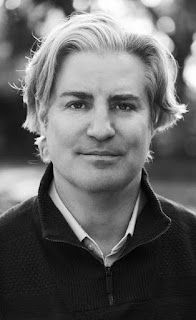Cole Haddon is the author of the new novel Psalms for the End of the World. Also a graphic novelist, screenwriter, and journalist, his work has appeared in a variety of publications, including the Melbourne Age and the Sydney Morning Herald. He lives in the Blue Mountains of Australia.
Q: What inspired you to write Psalms for the End of the World?
A: I began to write Psalms for the End of the World in January 2018. It was 3am, and I had my nine-day-old son strapped to my chest. My mother had recently died. Within a couple months, I would learn my father would die, too, if he didn’t receive a double lung transplant.
Outside my window in Southeast London, the UK was in a state of upheaval because some maniacs had convinced the country to drive off the Brexit cliff. The rest of Europe was sliding toward right-wing extremism, too.
And in America, the country of my birth, there was, of course, Trump. My family and I had fled the US after the 2016 election – we were those people.
Basically, everything I had ever known seemed to be burning down around me, a feeling exacerbated by daily news about climate change. There was all this death and grief and endless mourning.
But there was also this life, this little baby, strapped to me. Full of potential. My other son was sleeping in the other room. I had a wife I adored.
I didn’t know how to make sense of this tension, this anxiety between despair for the future and hope because I was, at least within the walls of my house, surrounded by it.
I think that’s what inspired me to start writing Psalms.
I’d been thinking about it for years, but at 3am, utterly confused by everything I was experienced, I decided to try to work through it, to interrogate it, in a story about connections made and lost. A story about questions about what it means to be alive in the 21st century. A story about how, as I like to say, we’re all connected by love, grief, and quantum physics.
Q: The actor Thomas Jane said of the book, “With Psalms, it’s as if [Haddon]’s written four terrific and totally unique books and folded them together into one Ekpyrotic meta-yarn.” What do you think of that description, and how would you describe the book's structure?
A: Well, I think my friend Tom has a way with words, for starters. But I think he’s probably describing Psalms’ – erm – modest ambition of tackling a mosaic of characters and genres across time.
Every storyline is having a conversation with the others in the book, but also, in a very meta way, popular culture and its role in how we see and experience and even define reality.
As for Psalms’ structure, it’s a cosmic trilogy, I suppose you would say. The novel itself is comprised of three “books” – which I think of as acts in a play – each bound spiritually and thematically to the journeys my central characters are on.
My editor loves to call it a “triple disc concept album of a book,” which I’ve always really liked as a description.
Q: How was the novel’s title chosen, and what does it signify for you?
A: I honestly couldn’t tell you where it came from, but it’s certainly the best title I’ve ever come up with. I know I was searching for one that captured the sense of anxiety about the future, about this terrible, pervasive sense of dread of what’s to come.
Q: What do you hope readers take away from the book?
A: I think that’s a challenging question, because Psalms was written to be a very subjective experience. Different readers take different things from it.
Some, for example, gravitate toward the amnesiac wrong man story at the heart of it, an accused terrorist on the run in 1962 with the diner waitress he can’t remember if he’s in love with or not.
Others fixate on the story of Keisha and Tab, Hollywood screenwriters whose relationship is falling apart as they work on a new script that echoes events happening elsewhere in the novel.
Still others won’t shut up about Abdul Fattah, a confused immigrant living in Sydney whose pet rabbit has ordered him to build bombs for mysterious purposes.
You asked about what I hope readers take from the book, though. I suppose I hope they feel confronted, perplexed, and moved. Most of all, I hope they feel less alone.
Q: What are you working on now?
A: I’ve finished a second novel, which I unfortunately can’t discuss yet despite how excited I am by it. I’ve also been commissioned to create a few different television series in Australia and the UK, and I’ve recently returned to writing essays and journalism.
Q: Anything else we should know?
A: Psalms for the End of the World isn’t due to be physically released in the US until 2023, but it is available in the States at the moment as an e-book and audiobook via Amazon, Barnes & Noble, and other online booksellers.
If American readers or readers anywhere else in the world want to own a hardback – and I would, as it’s a beautiful book – they can find the relevant info at this link: https://lnk.bio/colehaddon.
Twitter: @Cole_Haddon
Facebook: @colehaddonwashere
Instagram: @colehaddonwashere
--Interview with Deborah Kalb


No comments:
Post a Comment